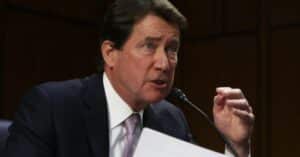The $1 trillion bipartisan infrastructure bill on Sunday night cleared a final set of procedural hurdles in the Senate, pushing it closer to passage in the coming days.
Sixty-eight senators voted to cut off debate, including 18 Republicans, paving a path forward for the legislation, which is one of the top priorities on President Joe Biden’s agenda. Final votes could drag into early Tuesday as a single GOP senator, Sen. Bill Hagerty (R-Tenn.), refused to relent on the mandatory debate time.
As many as 20 Republicans are expected to join Democrats in the evenly split Senate for what would be a robust final tally. If approved, it would go to the House.
If passed by the Senate, the bipartisan bill would head to the House of Representatives, which Democrats also control by a narrow margin.
The legislation is set to face uncertainty in the House, where House Speaker Nancy Pelosi (D., Calif.) has asserted said that she will not hold a House vote until the Senate passes a separate, much larger $3.5 trillion budget framework via budget reconciliation rules.
“I said yesterday we could do this the easy way or the hard way,” Democratic Senate Majority Leader Chuck Schumer (D-N.Y.) said on the Senate floor. “Yesterday, it appeared that some Republicans would like the Senate to do this the hard way. In any case, we’ll keep proceeding until we get this bill done.”
The bipartisan framework focuses mostly on core infrastructure projects like roads, water, and bridges, and the Democrat-sponsored $3.5 trillion proposal includes massive spending for national preschool, free community college, and Medicare expansion, and some of Biden’s other priorities, such as climate measures.
Democrats in the House and Senate are working together to ram the package through the chamber using the budgetary tool that will allow them to sidestep a Republican filibuster in the 50-50 split Senate to pass the $3.5 trillion in funding on party lines. Senate democrats previously used budget reconciliation rules to pass the $2 trillion American Rescue Plan with zero Republican backing.
Paying for the package has been a pressure point throughout the months of negotiations after Democrats objected to an increase in the gas tax paid at the pump and Republicans resisted a plan to bolster the IRS to go after tax scofflaws.
Unlike Biden’s bigger $3.5 trillion package, which would be paid for by higher tax rates for corporations and the wealthy, the bipartisan package is funded by repurposing other money, including untapped COVID-19 relief funds, sales of future spectrum auctions and proceeds, and the return of unemployment insurance funds from some states over the next decade.
The Associated Press contributed to this report.



